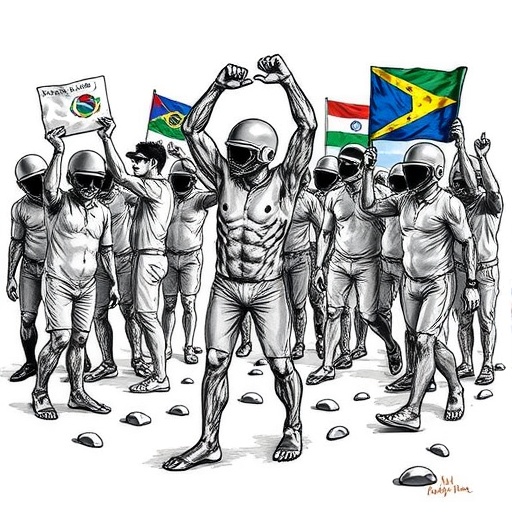In the realm of social justice and political discourse, the narratives surrounding male bodies, especially in the context of the South American polycrisis, emerge as a profound discourse on violence, identity, and power. Christopher D. Hoskins, in his upcoming article “Dismissed, Displayed, and Disposed of: Political Violence Against the Male Body in the South American Polycrisis,” explores how political violence transcends the mere physicality of the male form to widen the lens of social critique, drawing attention to the complex interplay between masculinity and systemic oppression.
In his paper, Hoskins delineates the multifaceted nature of political violence as it pertains to male bodies caught in the throes of societal upheaval. The South American polycrisis—a term describing the myriad socio-political, economic, and environmental crises confronting the region—serves as a fertile ground for examining the cultural narratives attached to masculinity. By framing these male bodies within the context of such crises, Hoskins invites us to interrogate the very foundations of gendered violence and its implications on political stability and societal structure.
As violence manifests in myriad forms—physical, emotional, and systemic—the male body often becomes a site of exploitation and objectification. Through a detailed analysis of current South American sociopolitical climates, Hoskins argues that these male figures are frequently dismissed as mere pawns in larger political games, their plights overshadowed by the complexities of the crises surrounding them. This treatment not only dehumanizes them but also distances society from the urgent need to address the real psychological and physical harms inflicted upon these individuals.
Central to Hoskins’ argument is the concept of visibility—how male bodies are displayed in political rhetoric and media representation. In many cases, violence against men in this region is sensationalized, with their bodies becoming symbols of broader societal woes. The graphic portrayals illustrated by the media strip away their humanity, reducing them to mere illustrations of societal failure. By doing so, society collectively excuses the violence perpetrated against them, failing to see the individual narratives and circumstances that comprise the male experience in the polycrisis.
The exploration of identity plays a pivotal role in this discussion. Male identity in South America is complex and riddled with cultural expectations, often rooted in machismo—a hypermasculine ideal that not only oppresses women but also exerts pressure on men. Hoskins asserts that this rigid framework leaves men feeling trapped, as they struggle against the dual forces of societal expectations and the harsh realities of political disenfranchisement. The tension created by these conflicting pressures contributes significantly to the kinds of violence that men face, as they often feel the need to conform to dangerous ideals of masculinity that valorize aggression and dominance.
Furthermore, Hoskins delves into the psychological repercussions of political violence, emphasizing how continual exposure to violence distorts personal and collective identities. The normalization of violence can lead to desensitization, further perpetuating cycles of abuse and circular violence. As male individuals navigate their experiences within this landscape of violence, their mental health deteriorates, manifesting in increased rates of depression, anxiety, and other disorders. The implications are profound—if the state and society neglect the care of these individuals, the repercussions will echo through generations.
Moreover, Hoskins brings into focus the intersectionality of violence against male bodies, examining how race, class, and immigration status compound the experiences of violence in nuanced ways. For instance, marginalized groups face greater risks of violence and discrimination. In contexts where state resources are stretched thin, these communities often bear the brunt of systemic neglect, a dynamic that exacerbates the crises they face. This intersectional lens not only highlights the disparities in lived experiences but also serves to amplify the voices of those often rendered invisible in mainstream discussions about political violence.
As Hoskins concludes, to understand the implications of political violence against male bodies requires a shift in societal narratives. Media representation must evolve away from mere sensationalist portrayals and instead focus on authentic storytelling that honors the lived experiences of individuals. By humanizing these narratives, society can cultivate empathy and responsibility, fostering a collective call to action against the systemic forces that perpetuate violence.
By prioritizing these conversations around male bodies in the South American polycrisis, there emerges a vision for the future rooted in understanding and resilience. Looking forward, it becomes imperative to create platforms for dialogue, where men can express vulnerability and seek support without fear of stigma. Such transformations demand active participation from all sectors—government, media, and civil society—to ensure that no individual is dismissed, displayed, or disposed of within the harsh realities of systemic violence.
Through the lens of Hoskins’ nuanced analysis, we are called to confront our collective responsibilities toward marginalized bodies and reconsider how societal perceptions of masculinity shape experiences of violence. The path forward lies in empathy, acknowledgment, and a commitment to change, necessary not only for healing individual traumas but for fostering a more equitable society for all.
In conclusion, Christopher D. Hoskins’ research provides a pressing and timely commentary on political violence and its manifestations, illuminating the often-ignored realities faced by men in crisis-affected regions. Through this work, he underscores the critical need for a profound societal transformation toward empathy and understanding, illuminating paths to healing and resilience amidst the polycrisis that continues to ensnare South America.
Subject of Research: Political Violence Against the Male Body in the South American Polycrisis
Article Title: Dismissed, Displayed, and Disposed of: Political Violence Against the Male Body in the South American Polycrisis
Article References:
Hoskins, C. Dismissed, Displayed, and Disposed of: Political Violence Against the Male Body in the South American Polycrisis.
Pastoral Psychol (2025). https://doi.org/10.1007/s11089-025-01270-y
Image Credits: AI Generated
DOI:
Keywords: Political violence, Male identity, South America, Polycrisis, Masculinity, Systemic oppression, Media representation, Psychological impact, Intersectionality, Mental health, Societal narratives.




